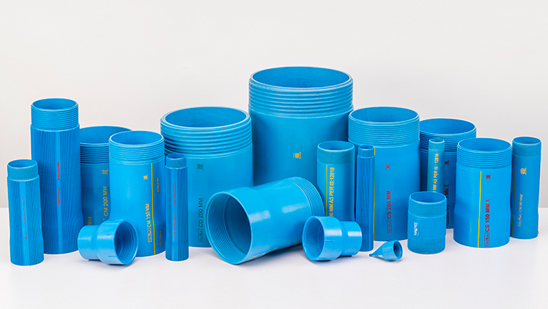The Role of Borewell Column Pipes in India’s Agricultural Success
India, a country deeply rooted in agriculture, relies heavily on groundwater to sustain its vast farming community. As the country faces challenges such as erratic rainfall and depleting surface water resources, the role of borewells in irrigation has become crucial. Among the many components that contribute to the efficiency of borewells, one that stands out is the borewell column pipe. These pipes play a pivotal role in ensuring that groundwater is efficiently extracted for agricultural use. In this blog, we’ll delve into how borewell column pipes have become an integral part of India’s agricultural success and why their proper installation and maintenance are vital.
What Are Borewell Column Pipes?
Borewell column pipes are essential components used in borewell systems to transport water from deep underground to the surface. These pipes are typically made from high-quality, corrosion-resistant materials that ensure longevity and functionality. The primary role of column pipes is to create a conduit for water extraction, connecting the pump at the bottom of the borewell to the surface, where it can be utilized for irrigation, drinking, and other uses.
Importance of Borewell Column Pipes in Agriculture
- Access to Groundwater
India’s agricultural sector is heavily dependent on irrigation, with over 60% of the country’s agricultural land relying on groundwater sources. Borewells, especially in areas with limited rainfall or seasonal droughts, are essential for accessing deep groundwater. Borewell column pipes are designed to handle high-pressure water flow, allowing farmers to access water from deep underground efficiently. - Efficient Water Transportation
When borewell column pipes are installed correctly, they ensure smooth transportation of water from the borewell to the surface. A well-designed pipe ensures minimal energy loss, helping the pump operate efficiently. This reduces the overall cost of irrigation and allows farmers to water their crops with less energy and more water efficiency. This becomes especially important in rural areas where electricity is scarce and the cost of energy can be prohibitive.
- Prevention of Contaminants
The quality of water is a major concern when it comes to borewells. Inadequately installed or poor-quality column pipes may allow contaminants such as soil, sand, or debris to enter the water source, affecting the quality of irrigation water. High-quality borewell column pipes with secure seals and connections prevent the ingress of such contaminants, ensuring the water extracted is clean and safe for crops. - Longevity and Durability
Borewell column pipes are designed to endure harsh conditions. In the diverse climates of India, these pipes are exposed to varying temperatures, humidity, and soil types. Quality pipes can last for years, reducing the need for frequent repairs or replacements. This durability provides farmers with a cost-effective solution for long-term irrigation needs. - Boosting Agricultural Productivity
With reliable access to water from borewells, farmers can ensure consistent irrigation, which is key to improving agricultural productivity. Especially in areas where surface water is scarce or unreliable, borewell column pipes help farmers maintain a steady supply of water to their fields. This, in turn, leads to healthier crops, higher yields, and more sustainable farming practices.
How to Choose the Right Borewell Column Pipes
The success of a borewell system depends on the selection of the right column pipes. Farmers should keep the following factors in mind when choosing pipes for their borewells:
- Material Quality: The material of the pipe should be resistant to corrosion and wear. PVC and UPVC are common materials used for their durability and resistance to environmental factors.
- Pipe Diameter and Length: The size of the pipe should match the dimensions of the borewell and the depth of the groundwater. This ensures efficient water flow and prevents the pump from overworking.
- Pressure Rating: Borewell column pipes need to withstand high water pressure. It’s important to choose pipes that are rated to handle the pressure specific to the depth of the borewell.
- Sealing and Fittings: Proper sealing and fittings are crucial for preventing leaks and ensuring that contaminants do not enter the water supply.
Maintaining Borewell Column Pipes for Long-Term Use
To ensure the continued success of borewells in agricultural practices, proper maintenance of column pipes is essential. Regular inspections can help detect issues like cracks, leaks, or blockages that may impede water flow. It’s also important to clean the pipes periodically to remove debris or sediment build-up, which can reduce the efficiency of the system.
Additionally, ensuring that the pump is working at optimal performance can prevent undue stress on the column pipes and prolong their lifespan. By addressing any issues quickly, farmers can ensure the long-term efficiency and reliability of their borewell systems.
Conclusion
Borewell column pipes play a critical role in India’s agricultural success. They provide farmers with access to reliable and efficient groundwater extraction, which is crucial in a country where water resources are often unevenly distributed. By selecting the right pipes, ensuring proper installation, and maintaining the system over time, farmers can harness the full potential of their borewells and contribute to the sustainability and growth of India’s agricultural sector.
For those looking to learn more about the installation and maintenance of borewell column pipes, it’s essential to consult with experts who can offer advice and guidance tailored to your specific needs. You can discover more about choosing the right materials and understanding how these systems work by visiting trusted sources online.
Leave a Reply